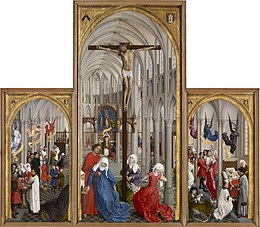
Back الأسرار المقدسة Arabic ܐܪܙܐ (ܡܫܝܚܝܘܬܐ) ARC اسرار الكنيسه السبعه ARZ Sakrament AZ Таінства BE-X-OLD Тайнство Bulgarian ধর্মসংস্কার Bengali/Bangla Sagrament Catalan Svátost Czech Sakrameńt CSB

| A series of articles on |
| Grace in Christianity |
|---|
|
|
| Part of a series on |
| Christianity |
|---|
 |
The term sacrament refers to a theological understanding of how the divine is made present within creation, and specifically to a Christian rite which is recognized as being particularly important and significant.[1] There are various views on the existence, number and meaning of such rites. Many Christians consider the sacraments to be a visible symbol of the reality of God, as well as a channel for God's grace. Many denominations, including the Catholic, Lutheran, Presbyterian, Anglican, Methodist, and Reformed, hold to the definition of sacrament formulated by Augustine of Hippo: an outward sign of an inward grace, that has been instituted by Jesus Christ.[2][3][4][5] Sacraments signify God's grace in a way that is outwardly observable to the participant.[5]
The Catholic Church, Hussite Church and the Old Catholic Church recognise seven sacraments: Baptism, Penance (Reconciliation or Confession), Eucharist (or Holy Communion), Confirmation, Marriage (Matrimony), Holy Orders, and Anointing of the Sick (Extreme Unction).[6][7] The Eastern Churches, such as the Eastern Orthodox Church and Oriental Orthodox Church as well as the Eastern Catholic Churches, also believe that there are seven major sacraments, but apply the words sacred mysteries corresponding to Greek word, μυστήριον (mysterion), and also to rites that in the Western tradition are called sacramentals and to other realities, such as the Church itself.[8][9][10] Many Protestant denominations, such as those within the Reformed tradition, preach just two sacraments instituted by Christ: the Eucharist (or Holy Communion) and Baptism.[11] The Lutheran sacraments include these two, often adding Confession (and Absolution) as a third sacrament.[11][12] Anglican and Methodist teaching is that "there are two Sacraments ordained of Christ our Lord in the Gospel, that is to say, Baptism and the Supper of the Lord," and that "those five commonly called Sacraments, that is to say, Confirmation, Penance, Orders, Matrimony, and Extreme Unction, are not to be counted for Sacraments of the Gospel."[13][14]
Some traditions, such as the Religious Society of Friends do not observe any of the rites, or, in the case of Anabaptists, hold that they are simply reminders or commendable practices that do not impart actual grace—not sacraments but "ordinances" pertaining to certain aspects of the Christian faith.[15]
- ^ Stice, Randy (21 November 2017). Understanding the Sacraments of Initiation: A Rite-Based Approach. LiturgyTrainingPublications. p. 41. ISBN 9781618331847.
- ^ The Junior Catechism of the Methodist Episcopal Church and the Methodist Episcopal Church, South. Jennings and Graham. 1905. p. 26.
87. What is a sacrament? A sacrament is an outward sign, appointed by Christ, of an inward grace. (Rom. 4:11.)
- ^ Lutheran Forum, Volumes 38–39. 2004. p. 46.
A sacrament is an outward sign of an inward grace.
- ^ Lyden, John C.; Mazur, Eric Michael (27 March 2015). The Routledge Companion to Religion and Popular Culture. Routledge. p. 180. ISBN 9781317531067.
Augustine defines a sacrament as "an outward sign of an inward grace". Reformed tradition subscribes to this definition (see McKim 2001: 135).
- ^ a b "Catechism of the Catholic Church, 1131". www.vatican.va. Retrieved 4 January 2020.
- ^ Journal of the Moscow Patriarchate. Patriarch of Moscow and all Rus'. 1977. p. 67.
The Czechoslovak Hussite Church professes Seven Sacraments.
- ^ Melton, J. Gordon; Baumann, Martin (21 September 2010). Religions of the World: A Comprehensive Encyclopedia of Beliefs and Practices, 2nd Edition. ABC-CLIO. p. 2137. ISBN 9781598842043.
The Old Catholic Church accepts seven sacraments, the intermediaries of salvation.
- ^ "Understanding the Sacraments of the Orthodox Church - Introduction to Orthodoxy Articles - Greek Orthodox Archdiocese of America". www.goarch.org. Retrieved 4 January 2020.
- ^ "Holy Trinity Church". Retrieved 4 January 2020.
- ^ Sacramental Rites in the Coptic Orthodox Church Archived 14 May 2011 at the Wayback Machine. Copticchurch.net. 4 August 2016.
- ^ a b Haffner, Paul (1999). The Sacramental Mystery. Gracewing Publishing. p. 11. ISBN 9780852444764.
The Augsburg Confession drawn up by Melanchton, one of Luther's disciples admitted only three sacraments, Baptist, the Lord's Supper and Penance. Melanchton left the way open for the other five sacred signs to be considered as "secondary sacraments". However, Zwingli, Calvin and most of the later Reformed tradition accepted only Baptism and the Lord's Supper as sacraments, but in a highly symbolic sense.
- ^ Smith, Preserved (1911). The Life and Letters of Martin Luther. Houghton Mifflin. p. 89.
In the first place I deny that the sacraments are seven in number, and assert that there are only three, baptism, penance, and the Lord's Supper, and that all these three have been bound by the Roman Curia in a miserable captivity and that the Church has been deprived of all her freedom.
- ^ Thirty-Nine Articles, Article XXV
- ^ Articles of Religion (Methodist), Article XVI
- ^ Jeffrey Gros, Thomas F. Best, Lorelei F. Fuchs (editors), Growth in Agreement III: International Dialogue Texts and Agreed Statements, 1998–2005 (Eerdmans 2008 ISBN 978-0-8028-6229-7), p. 352